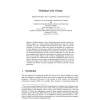Free Online Productivity Tools
i2Speak
i2Symbol
i2OCR
iTex2Img
iWeb2Print
iWeb2Shot
i2Type
iPdf2Split
iPdf2Merge
i2Bopomofo
i2Arabic
i2Style
i2Image
i2PDF
iLatex2Rtf
Sci2ools
ER
1999
Springer
1999
Springer
Modeling Cyclic Change
Database support of time-varying phenomena typically assumes that entities change in a linear fashion. Many phenomena, however, change cyclically over time. Examples include monsoons, tides, and travel to the workplace. In such cases, entities may appear and disappear on a regular basis or their attributes or location may change with periodic regularity. This paper introduces an approach for modeling cycles based on cyclic intervals. Intervals mportant abstraction of time, and the consideration of cyclic intervals reveals characteristics about these intervals that are unique from the linear case. This work examines binary cyclic relations, distinguishing sixteen cyclic interval relations. We identify their conceptual neighborhood graph, showing which relations are most similar and demonstrating that this set of sixteen relations is complete. The results of this investigation provide the basis for extended data models and query languages that address cyclically varying phenomena.
Related Content
| Added | 04 Aug 2010 |
| Updated | 04 Aug 2010 |
| Type | Conference |
| Year | 1999 |
| Where | ER |
| Authors | Kathleen Hornsby, Max J. Egenhofer, Patrick J. Hayes |
Comments (0)

